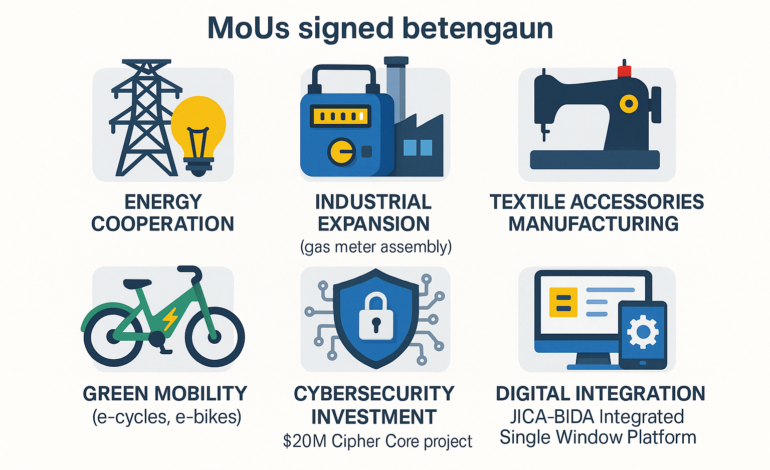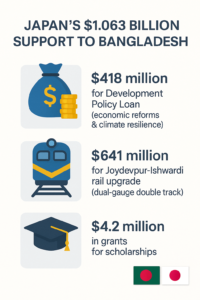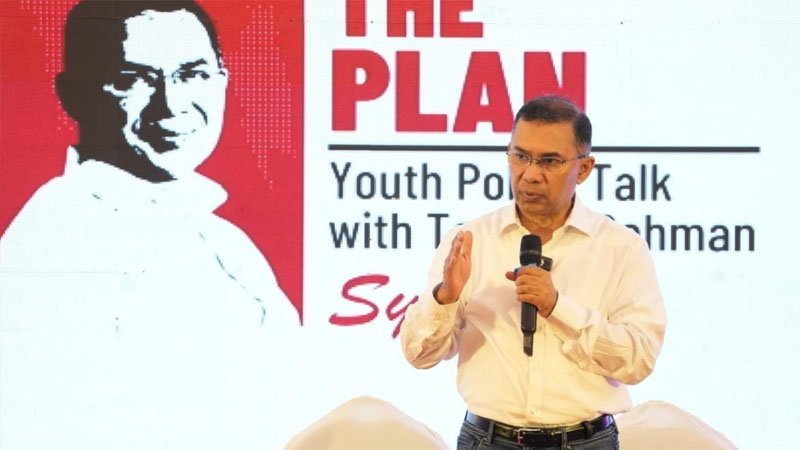Japan Pledges $1 Billion Support as Yunus Strengthens Strategic Ties in Tokyo

Japan Pledges Over $1 Billion to Bangladesh as Yunus Secures Strategic, Economic Deals in Tokyo
Japan has pledged over $1 billion in financial support to Bangladesh through a mix of loans and grants, in a major boost to the interim government’s reform and recovery efforts. The announcement came during Chief Adviser Prof Muhammad Yunus’s four-day official visit to Japan, underscoring growing bilateral cooperation and a shared vision for a stable, prosperous Indo-Pacific.
The $1.063 billion package includes a $418 million Development Policy Loan aimed at economic reforms and climate resilience, $641 million for upgrading the Joydevpur-Ishwardi rail line to a dual-gauge double track, and $4.2 million in scholarships.
Formalized through agreements signed by Bangladesh Ambassador Md Daud Ali and Japanese Ambassador Shinichi Saida, the funding reflects Tokyo’s continued confidence in Bangladesh’s political transition and strategic importance.
Yunus, who arrived in Tokyo on May 28, held bilateral talks with Japanese Prime Minister Shigeru Ishiba, receiving a guard of honour ahead of their meeting. In a symbolic gesture, Yunus gifted Ishiba the book Art of Triumph, chronicling the July uprising in Bangladesh.
Six MoUs to Strengthen Investment and Innovation
On the sidelines of the visit, six Memoranda of Understanding (MoUs) were signed during the Bangladesh Business Seminar in Tokyo, spanning energy, manufacturing, green mobility, cybersecurity, and digital infrastructure.
-
Energy: The Japan Bank for International Cooperation (JBIC) signed an MoU with Bangladesh’s Energy and Mineral Resources Ministry to enhance cooperation in energy projects.
-
Manufacturing: ONODA Inc signed a land lease deal with Bangladesh Special Economic Zone (BSEZ) to expand gas meter assembly operations, while Naxis Co Ltd announced plans to produce apparel accessories in Bangladesh.
-
Green Mobility: Glafit and Musashi Seimitsu, in partnership with BIDA, will support a new facility to produce battery-powered bicycles and electric motorcycles.
-
Cybersecurity: Cipher Core Co Ltd pledged $20 million to launch a pilot project deploying Complete Cipher Technology in Bangladesh, granting exclusive regional rights to a local partner.
-
Digital Integration: JICA and BIDA signed a deal to support the Integrated Single Window Platform (ISWP), aimed at streamlining investment processes across government agencies.
Yunus, addressing the business forum, praised Japan’s enduring friendship and said, “We want to show history that it was done — and done perfectly. With your support, it is doable. It’s not about making money; it’s about changing people’s lives.”

Strategic and Security Cooperation
Beyond economics, Yunus and Ishiba reaffirmed their commitment to political and security cooperation. Japan agreed in principle to sign the Agreement Concerning the Transfer of Defence Equipment and Technology and confirmed the early delivery of five patrol boats to the Bangladesh Navy under the Official Security Assistance program.
The two leaders also agreed to expedite negotiations on an Economic Partnership Agreement (EPA), which would secure duty- and quota-free market access for Bangladeshi products post-LDC graduation.
Focus on Rohingya Crisis and Indo-Pacific Vision
The ongoing Rohingya refugee crisis was another key agenda. Both sides emphasized that the long-term solution lies in the voluntary, safe, and dignified repatriation of refugees to Myanmar. Japan commended Bangladesh’s humanitarian efforts, while Bangladesh reaffirmed its commitment to regional peace.
Ishiba praised Yunus’s leadership, stating, “Bangladesh plays a critical role in ensuring Indo-Pacific stability. We are confident this new chapter under your guidance will be transformative.”
Yunus, in return, acknowledged the difficult challenges inherited by his government and reiterated a pledge to build a free, open, and inclusive Indo-Pacific, working closely with Japan on maritime security, connectivity, and transnational crime prevention.
Labour Mobility and Human Capital
The visit also led to new opportunities for Bangladeshi workers, as the two nations signed agreements to facilitate training and employment of skilled workers. Japan may hire up to 100,000 Bangladeshi workers over the next five years to address its labour shortage.
With bilateral trade currently standing at $4 billion and Japanese development assistance exceeding $24 billion since independence, the visit marks a new milestone in Japan-Bangladesh relations.
Yunus concluded his visit today, leaving Tokyo with a reinvigorated roadmap for cooperation and shared prosperity.







